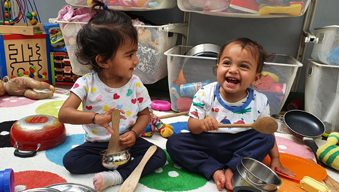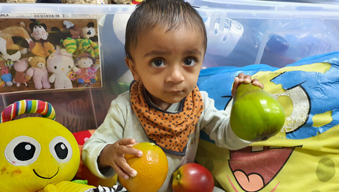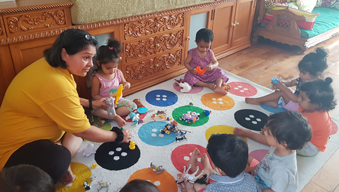





For children under three, Communication & Language is essential for building secure relationships and early understanding of the world around them. At this age, babies and toddlers begin to make sounds, respond to voices, and use simple words to express needs and emotions.
Through warm, responsive interactions, songs, stories, and play, they develop listening and attention skills, laying the foundation for future speech and comprehension. Supporting early communication not only nurtures confidence and curiosity but also strengthens emotional bonds and helps children feel understood, valued, and ready to explore their environment.

Even the simplest play sparks rich communication. As children explore sounds using everyday objects, they share laughter, eye contact, and joyful exchanges that build the foundation for language.
Through turn-taking, imitation, and shared attention, they learn that communication is fun and meaningful. These playful moments support the Communication & Language prime area of learning, helping young children develop early listening, understanding, and expressive skills that will support their relationships and future learning.

We use real-life objects to spark curiosity and early conversations. As children explore colourful fruits, they listen, point, and begin to use new words to describe what they see, feel, and taste. These rich, hands-on experiences help develop understanding, vocabulary, and confidence to express ideas.
Through responsive interactions and encouragement, children learn that their words and gestures have meaning - a key part of the Communication & Language prime area of learning that supports their thinking, social skills, and early literacy development.

In our group time (just don't like the term "circle time") we create wonderful opportunities for children to develop their listening and speaking skills. Sitting together in a small huddle, they share ideas, name their toys, and respond to questions, learning to take turns in conversation.
These meaningful interactions help children expand vocabulary, follow instructions, and gain confidence in expressing thoughts. Through play and storytelling, our educators model rich language, supporting the Communication & Language prime area of learning and nurturing the strong foundations needed for literacy, social connection, and future success.
Parents can support their child’s communication & language development at home by talking, singing, and reading together every day. Responding to their child’s sounds and gestures, naming familiar objects, and describing daily routines helps build understanding and vocabulary.
Turning off background noise, maintaining eye contact, and listening carefully show children that their voice matters. Simple activities like singing nursery rhymes, looking at picture books, and repeating new words make learning language natural, fun, and nurturing for children under three.
If you need more tips or advice, please contact us. Even if your child doesn't attend the nursery, we will gladly help.
“Words are, of course, the most powerful drug used by mankind.” - Rudyard Kipling

We take the task of nourishing children’s minds and bodies very seriously and ensure that their diet at the daycare is healthy and well balanced.
Daily Walking
As part of our programme of keeping our children fit, we encourage them to walk, jog or run a mile at least once a week.

| Mon - Fri | 07:30 - 18:30 |
| Sat | Closed |
| Sun | Closed |


